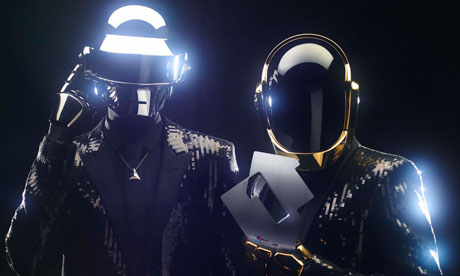
Ballads. Jazzy interludes. Low BPMs. Live drums. An Andrew Lloyd Webber moment. These things don't often figure in discussions of Daft Punk, the electronic duo whose filtered French house crossed over from clubs to charts 16 years ago with their debut album, Homework. Random Access Memories, their fourth studio album, is one of the most fiercely anticipated releases of the year. Interest in the Parisian androids reached a febrile thrum earlier this year when Pharrell Williams, Nile Rodgers, Julian Casablancas and Panda Bear were revealed as guests in a campaign of drip-fed information which peaked with a glitter bombshell: Get Lucky. This retro-futurist funk masterpiece is now the biggest hit of Daft Punk's career, No 1 for most of the spring.
Kanye West's generous sampling of Daft Punk's Harder Better Faster Stronger on his 2007 single Stronger can take some credit for the seep of Daft into the US mainstream. Moreover, RAM is now being released into a cultural climate in which electronic dance music – that bogus canned stuff made by effete, metrosexual Europeans, or so America had it – has finally been embraced by vast swaths of the US heartland: frat boys and their ilk.
Just as electronic dance music is having its day, however, RAM wrong-foots preconceptions of what a new DP album might be – squelchy, chic, made on computers, by robots – with the agility of an amyl-assisted mountain goat. This is a 13-track, 80-minute love letter to synthetic music and dancing in which many of the pillars of electronic club music are swerved. Only one song features samples, apparently. Contact begins with Apollo mission astronaut Gene Cernan reporting a UFO sighting, and features a lift from Australian band the Sherbs before closing the album with a spectacular wig-out that demands head-banging, not genteel boogie-ing.
Throughout, the strings on RAM are made of catgut, not 1s and 0s; human orchestras swell. On Fragments of Time there may even be a lap steel guitar sighing. RAM's sound design is less indebted to techno and house than to funk and soft rock, for both good and ill. We actually get lucky twice. The single's twin is called Lose Yourself to Dance and it nags even harder, with handclaps, a stereo pan of robots urging "c'mon, c'mon" and Pharrell Williams offering you his shirt to mop up the sweat.
However, you do regularly want to knock on the helmets worn by Thomas Bangalter and Guy-Manuel de Homem-Christo, and inquire after their wellbeing. There is a surfeit of sad robot-muzak here, some cheesy (The Game of Love), some of it effective (Beyond). Touch, meanwhile, is a collaboration with songwriter Paul Williams (the Carpenters, the Muppets), providing little more than a mid-album experiment whose prolixity and proximity to the West End stage just baffles. No such reservations greet Giorgio By Moroder, a triumph of updated retro synthetics that begins as a dinner party chat with the famous bassline architect. It expands into a series of movements in which a vintage early synth melody gives way to climax after climax, where real and electronic parts compete for primacy.
It is hard to believe now that Daft Punk's stock as innovators had plateaued somewhat, given the relatively muted response to 2005's Human After All and their Tron soundtrack. With RAM – a masterpiece complete with flaws – Daft Punk have shone a laser beam into dark corners of the 70s and 80s and made them sing again, with timbres more human than ever before.

